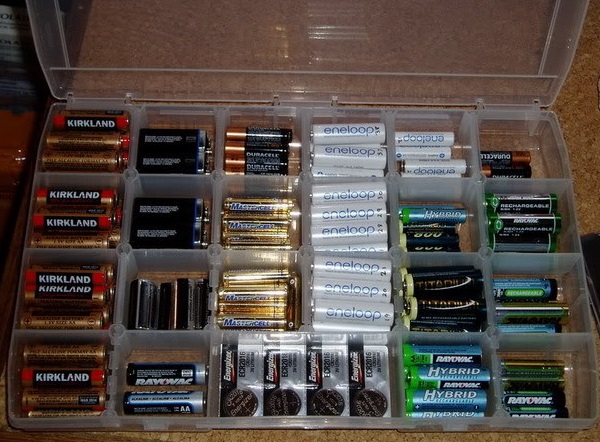
Storing batteries isn’t rocket science. Far from it. But sometimes it seems like batteries are a “mystical” part of preps and that they should be treated with “kid gloves” lest they fail you when most needed. Nope. Not at all.
In fact, the good news about batteries is that they can–and should–be treated very similarly to your food storage. Simply keep them in a cool, dry place and you’re good to go. Really.
[Note that the following advice is for any common battery type, e.g., alkaline or lithium batteries.]
Myth #1: Keep batteries in the fridge or freezer to increase longevity
While true that storing batteries in a colder environment is better than a hot one, there seems to be no benefit to storing batteries in the fridge or freezer. Personally, I used to do this because I thought it was the right thing to do but now I just keep them on a shelf with some other preps.
I should point out that excessive moisture levels can be a problem for batteries so you’ll want to store them in a place that has lower humidity levels, such as an air conditioned room in the home, perhaps the basement if it’s dry, or wherever. Places such as the bathroom or maybe the laundry room are NOT the best places to store them and even the fridge might pose more of a problem than a benefit due to higher humidity inside the fridge.
Myth #2: Batteries can only “go bad” when actually being used
Because batteries rely on chemical processes to provide power over time batteries will run down or “go bad” even if not used. And, while this isn’t usually an issue for most people because they tend to use batteries before any noticeable effects, it can become a problem for prepping purposes for the simple fact that you and I are likely to store more batteries than the “average Joe” and therefore not actually use them all before replenishing.
You can combat this problem by (1) actually using and rotating batteries from your preps and (2) purchasing “low self discharge” or LSD versions of batteries where possible. LSD batteries refer to rechargeable battery types and there’s none better than Eneloops. From my own experiences and because of testing by people far smarter than I, Eneloops are the way to go for reliability. As for alkaline batteries, just buy quality name brands like Energizer or Duracell.
Remember, so long as you treat your batteries similarly to your food storage–stored in a cool, dry place and rotated–then you have little to worry about.

Leave a Reply